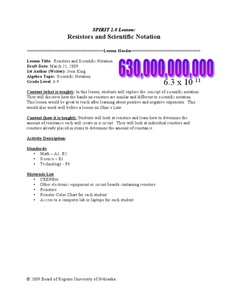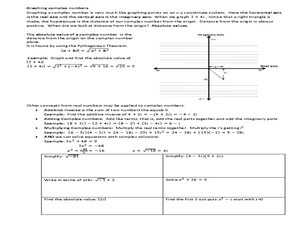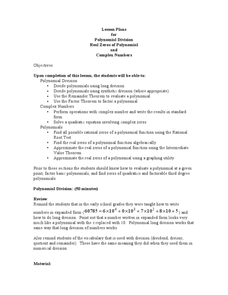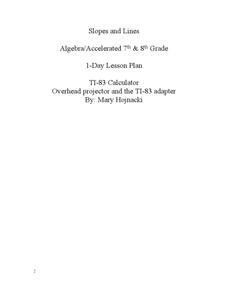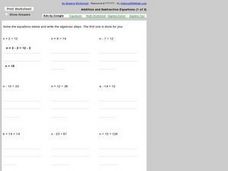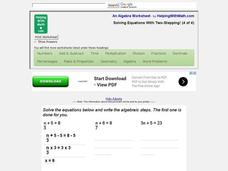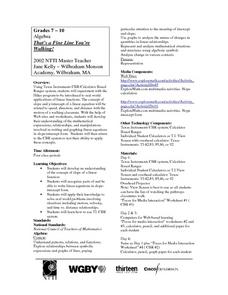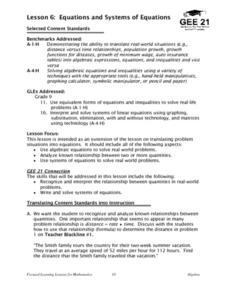Curated OER
Factoring Trinomials
Students factor trinomials using specific steps. In this algebra lesson, students factor polynomials following the steps on a smart lesson. They review important vocabulary to help with solving the problems.
Curated OER
Resistors and Scientific Notation
Students explain the importance of scientific notation. In this physics lesson, students determine the resistance of resistors using the colored bands. They compare and contrast scientific notation and resistor band notation.
Curated OER
Complex Number
In this algebra instructional activity, students identify the vertex of a quadratic functions. They identify complex numbers. There are 6 questions.
Curated OER
Polynomial Divisions
Pupils factor polynomials and use long division t solve problems. In this algebra lesson, students find the zeros of polynomials by synthetic and long division. They perform operation using complex numbers.
Curated OER
Solving Quadratic Equations by Graphing
Students solve quadratic equation by graphing. For this algebra lesson, students use the TI calculator to get a visual of their graph. They create a table of values, plot their points and graph the parabola.
Curated OER
Exponents - Week 1
In this exponent worksheet, students add, subtract, multiply and divide exponents. They solve problems containing negative exponents, fractional exponents, and polynomials. This two-page worksheet contains eight problems.
Curated OER
Negative Exponents and Scientific Notation
In this exponent rules worksheet, students simplify 56 negative exponents and scientific notation problems. Students use exponent rules to simplify each problem.
Curated OER
Systems of Word Problems
Ninth graders investigate systems of linear equations. In this Algebra I lesson, 9th graders explore word problems that can be solved by using a system of equations. The problems involve such topics as cell phone usage, gym...
Curated OER
Slopes and Lines
Young scholars identify the slopes of a line. For this algebra lesson, students calculate the slope and intercept of a line. They graph their lines using a TI calculator.
Helping with Math
#5: Addition & Subtraction Equations (1 of 2)
Single-step addition or subtraction operations are applied in order to solve these 12 simple equations. An answer key is available, not so much for you, but perhaps to be used by learners as a self-correction tool. Note that the...
Helping with Math
Solving Equations with Two-Stepping! (4 of 4)
Here are 12 two-step algebraic equations to be solved. The first problem is completed as an example to your class, but the remaining can be worked right on the page. An answer key is available by clicking on a small box at the top of the...
Curated OER
That's a Fine Line You're Walking!
Students experiment with Hiker program to practice real world applications of linear functions and develop their understanding of expressions, relationships, and manipulations involved in writing and graphing linear equations in...
Curated OER
Introduction to Linear Functions
Students are introduced to the concept of linear functions. Using new terminology, they describe linear functions in sentences and in data tables. Using the internet, they calculate and record answers to problems which are discussed...
Helping with Math
Solving Equations with Two-Stepping! (2 of 4)
Multi-step problems are part of the progression when learning to solve equations. These 12 problems require only two steps to arrive at an answer. Either print the page out to assign as homework, or have learners write down the problems...
Helping with Math
#10: Solving Equations (2 of 2)
In this prealgebra activity, pupils perform addition, subtraction, multiplication, or division operations to solve for an unknown. There are 12 problems to be solved. Use this as a quiz to assess how well your class is grasping the skill...
Curated OER
Using Inequalities to Problem Solve
Students explore inequalities. For this Algebra I lesson, students solve and graph linear inequalities involving addition, subtraction, multiplication, or division. Students use inequalities to solve and graph real-world problems.
Curated OER
The Mandelbrot Set
Students are introduced to the notion of a complex number and function iteration in order to motivate the discussion of Julia sets and the Mandelbrot set.
Curated OER
Equations and Systems of Equations
Students practice using algebra to be applied to real world situational problems. The key concepts of translation of language to algebraic expressions is covered. They also look in depth at relationships between different quantities.
Curated OER
A Point of Intersection
Students factor and solve systems of equation. In this algebra lesson plan, students identify the point of intersection using substitution, elimination and graphing. They write an equation given a system and a graph.
Curated OER
Introducing Linear Terminology
Ninth graders graph linear equations and inequalities in two variables and then, they write equations of lines and find and use the slope and y-intercept
of lines. They use linear equations to model real data and define to define the...
Curated OER
How are we Related?
Young scholars differentiate functions based on their domain and range. For this algebra lesson, students define function, domain, range and relation. They analyze graphs and coordinate pairs for input and output values making up a...
Pennsylvania Department of Education
Extending Pattern Understandings
Students use shapes and manipulatives to demonstrate patterns. In this patterns lesson plan, students also break up patterns to identify a pattern unit.
Curated OER
Being Equal is No Monkey Business
First graders study what an equation is before working to determine how to divide an odd number of items in an equitable way. They divide equations into those that are true and those that are not while two students act as the king and...
Alabama Learning Exchange
Properties of Minerals
High schoolers explore the basic building blocks of our planet. In this minerals lesson students begin the process of forensics on the basis of investigation and drawing conclusions from observations.



